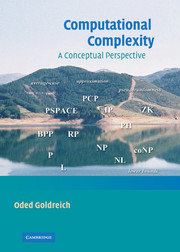Book contents
- Frontmatter
- Contents
- List of Figures
- Preface
- Organization and Chapter Summaries
- Acknowledgments
- 1 Introduction and Preliminaries
- 2 P, NP, and NP-Completeness
- 3 Variations on P and NP
- 4 More Resources, More Power?
- 5 Space Complexity
- 6 Randomness and Counting
- 7 The Bright Side of Hardness
- 8 Pseudorandom Generators
- 9 Probabilistic Proof Systems
- 10 Relaxing the Requirements
- Epilogue
- Appendix A Glossary of Complexity Classes
- Appendix B On the Quest for Lower Bounds
- Appendix C On the Foundations of Modern Cryptography
- Appendix D Probabilistic Preliminaries and Advanced Topics in Randomization
- Appendix E Explicit Constructions
- Appendix F Some Omitted Proofs
- Appendix G Some Computational Problems
- Bibliography
- Index
10 - Relaxing the Requirements
Published online by Cambridge University Press: 05 June 2012
- Frontmatter
- Contents
- List of Figures
- Preface
- Organization and Chapter Summaries
- Acknowledgments
- 1 Introduction and Preliminaries
- 2 P, NP, and NP-Completeness
- 3 Variations on P and NP
- 4 More Resources, More Power?
- 5 Space Complexity
- 6 Randomness and Counting
- 7 The Bright Side of Hardness
- 8 Pseudorandom Generators
- 9 Probabilistic Proof Systems
- 10 Relaxing the Requirements
- Epilogue
- Appendix A Glossary of Complexity Classes
- Appendix B On the Quest for Lower Bounds
- Appendix C On the Foundations of Modern Cryptography
- Appendix D Probabilistic Preliminaries and Advanced Topics in Randomization
- Appendix E Explicit Constructions
- Appendix F Some Omitted Proofs
- Appendix G Some Computational Problems
- Bibliography
- Index
Summary
The philosophers have only interpreted the world, in various ways; the point is to change it.
Karl Marx, “Theses on Feuerbach”In light of the apparent infeasibility of solving numerous useful computational problems, it is natural to ask whether these problems can be relaxed such that the relaxation is both useful and allows for feasible solving procedures. We stress two aspects about the foregoing question: On the one hand, the relaxation should be sufficiently good for the intended applications; but, on the other hand, it should be significantly different from the original formulation of the problem so as to escape the infeasibility of the latter. We note that whether a relaxation is adequate for an intended application depends on the application, and thus much of the material in this chapter is less robust (or generic) than the treatment of the non-relaxed computational problems.
Summary: We consider two types of relaxations. The first type of relaxation refers to the computational problems themselves; that is, for each problem instance we extend the set of admissible solutions. In the context of search problems this means settling for solutions that have a value that is “sufficiently close” to the value of the optimal solution (with respect to some value function). Needless to say, the specific meaning of “sufficiently close” is part of the definition of the relaxed problem. […]
- Type
- Chapter
- Information
- Computational ComplexityA Conceptual Perspective, pp. 416 - 460Publisher: Cambridge University PressPrint publication year: 2008



